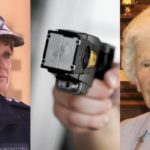NSW Has a Police Problem, Says Higginson, “Use of Excessive Force and Misconduct are Systemic”

NSW police senior constable Kristian White pulled his taser out, as 95-year-old great-grandmother Clare Nowland, who was holding a steak knife, was approaching with the aid of her walking frame, and the 33-year-old officer then stunned her with his device.
White allegedly tasered Nowland once in the chest and a second time in the back, just to ensure the woman who suffered dementia and was standing in a Cooma aged care facility, where she lived, didn’t pose him or anyone else a threat.
Nowland fell to the ground, fracturing her skull and spent the rest of her days in a hospital receiving end-of-life care, passing away a week later. And so outrageous was this horrific approach to law enforcement by a NSW police officer, that the 17 May incident was reported the world over.
On the day of Nowland’s death, NSW police announced White had been charged with three assault offences, descending in seriousness. However, considering the elderly woman died as a result of his actions, there are those asking whether harsher penalties are warranted.
But as dumbfounded as the community is by the tasering death, NSW Greens MLC Sue Higginson has pointed out that while this is an extreme example of it, NSW police excessive use of force incidents are all too common.
Indeed, whilst officers are supposed to be protecting the public from violence, they’re rather perpetrating it.
Attacking the vulnerable
“Under no circumstances should the NSW community have to accept police use of excessive force or police violence,” said Higginson. “There are an alarming number of reports of police causing harm. We need to accept that we actually have a police problem in NSW.”
“This is a systemic issue, as has been shown by the revelations of other incidents of police using excessive and lethal force on vulnerable people following the tasering of Clare Nowland,” the NSW Greens justice spokesperson told Sydney Criminal Lawyers.
And Higginson pointed to the shooting death of Steven Pampalian just last Thursday. The incident occurred as the 41-year-old man was holding two chef knives and acting erratically on the North Willoughby street, where he lived. And whilst tasering was an option, he was shot four times.
But not all NSW police excessive use of force incidents are lethal. The Greens MLC recalled that a 14-year-old First Nations boy ended up in hospital with head injuries, after officers arrested him in Coraki last September.
And many will recall two police officers slamming Sydney identity Danny Lim headfirst into a tiled floor in November, for the crime of standing around in the QVB shopping mall.
“As a priority we need to end police investigating police. The case of Clare Nowland should be referred to the Law Enforcement Conduct Commission for a fully independent investigation,” Higginson made clear, adding that the LECC should be conducting most misconduct investigations.
A lethal force
The reaction NSW police commissioner Karen Webb had to the incident has been greatly condemned.
Predominantly, this was due to the fact that she declared she wouldn’t watch the bodycam footage of the incident, an assertion she later retracted upon, but also because of her attempt to excuse the officer’s extreme actions by stating its “quite rare” for police to be called out to nursing homes.
“Every member of the community no matter who they are, where they are or what time it is, should feel safe to call the police for help,” Higginson maintained. “It is the fundamental role of the police to keep communities safe and to render assistance to those in need.”
An obvious issue is that police training and upgrading of officer skills is so inadequate that what seems warranted is a paragraph in the policing manual outlining that tasering and assaulting the elderly isn’t reasonable use of force, and nor is shooting people in distress or bashing teenagers.
Although rather than focus on training, the Coalition gifted NSW police with a smorgasbord of expanded powers over the last decade, which hasn’t been accompanied with “the necessary and commensurate oversight and accountability mechanisms”, the Greens politician continued.
And the lawyer further underscored that it’s long been considered that trigger-happy police shouldn’t be dealing with mental health incidents and rather “suitably trained and qualified” individuals should be, yet this needs to be addressed by “comprehensive and systemic” reforms.
“Given this problem is not likely to be sorted immediately, it is imperative that this be a turning point in policing and police responses when dealing with vulnerable and disadvantaged people,” she added. “We need a guarantee that police can and will deal with these types of situations.”
Enforcing its worth
Since the 2020 US police killing of George Floyd, there’s been a global shift in attitudes towards law enforcement and proposals like defunding the police have become more mainstream.
In this country, questions are being asked about whether turning the other cheek to the odd and persistent police use of excessive force in exchange for supposedly safer streets is really necessary, especially when these incidents involve children and the frail.
Yet, what the NSW Police Force wants it gets, under the bipartisan arrangement that sees whichever major party forming government on Macquarie Street, continuing to bolster the powers of police, whilst whittling away at the rights of civilians, all in the name of appearing tough on crime.
“We have a police problem in NSW,” Higginson went on. “The issues with police responses, use of excessive force and misconduct are systemic, the case of Clare Nowland is just the tip of the iceberg.”
Compared to its usual approach to officer misconduct, White was hurriedly charged within a week of the incident. But this band-aid approach to calm public outrage hasn’t assuaged parliamentarians, like Higginson, with a cross-party call for an inquiry into policing powers being made last week.
“Criminal charges for the police officer involved in the death of Clare Nowland are important and necessary but don’t deliver the systemic accountability that we need,” Higginson said in conclusion.
“It’s not only about this one officer, it’s about a system that’s failing. We need to examine this and develop reforms that will prevent anything like what happened to Clare Nowland from happening again.”







